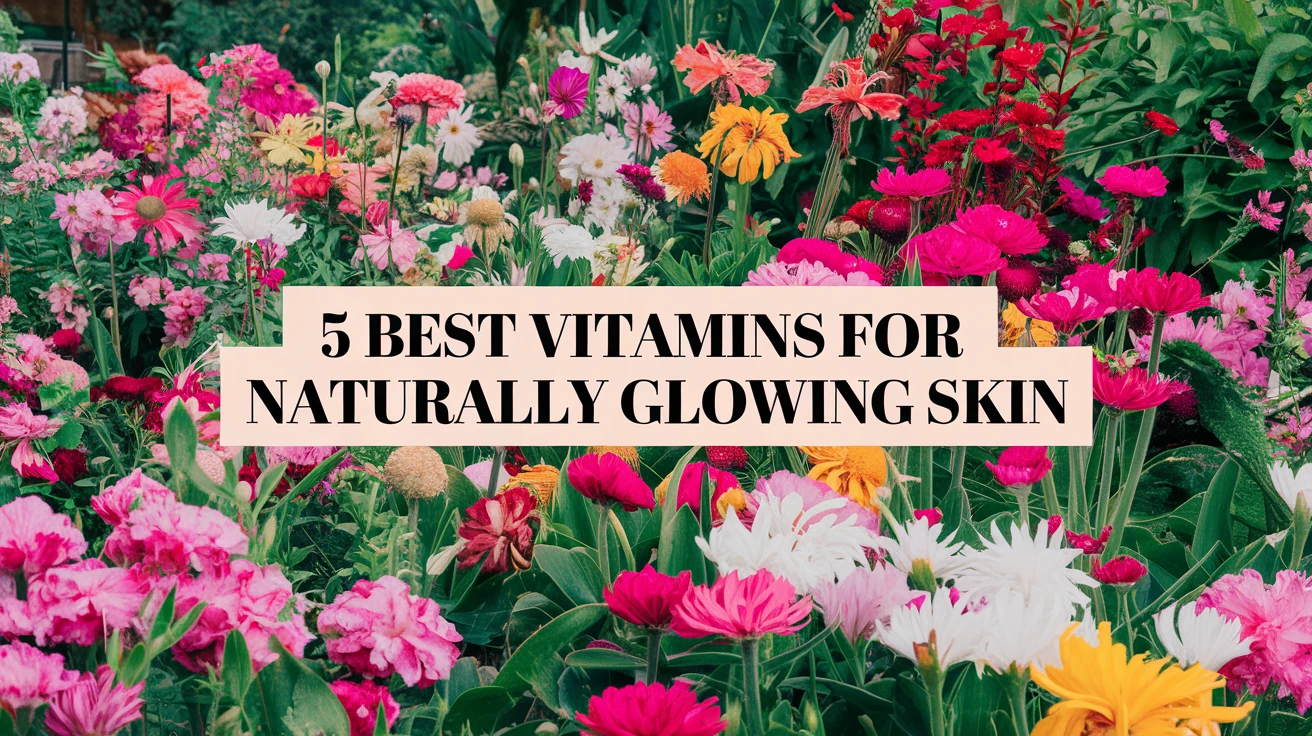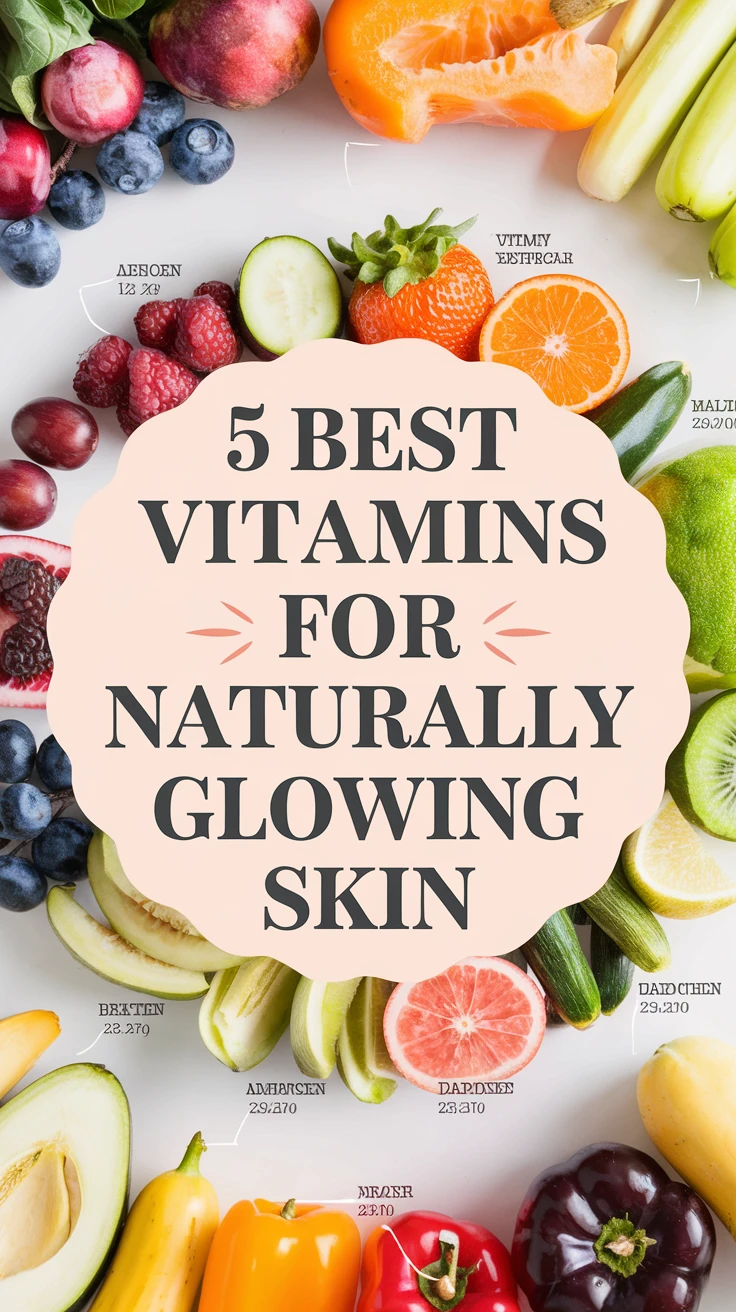
The quest for naturally glowing skin often leads us down countless beauty aisles, trying expensive creams and serums. However, the secret to radiant skin might be simpler than we think: vitamins. These essential nutrients work from within to transform your skin, making them nature’s own beauty solution. Whether through diet or supplements, understanding which vitamins benefit your skin can revolutionize your skincare routine. Let’s explore the five most powerful vitamins that can help you achieve that coveted natural glow.
Before diving into specific vitamins, remember that healthy skin starts from within. While topical treatments have their place, nourishing your skin from the inside out creates lasting results. Think of your body as a garden – the better you nourish the soil, the more beautiful the flowers will bloom. The same principle applies to your skin.
Vitamin C: The Collagen-Boosting Superhero
Vitamin C stands as the cornerstone of skin health, and I learned this firsthand when I incorporated it into my daily routine. After three months of consistent vitamin C supplementation, both internally and topically, the improvement in my skin’s brightness was remarkable.
Key Benefits:
– Stimulates collagen production
– Brightens skin tone
– Fights free radical damage
– Reduces hyperpigmentation
– Enhances skin repair
Best Food Sources:
| Food | Vitamin C Content (per 100g) |
|---|---|
| Orange | 53.2mg |
| Strawberries | 58.8mg |
| Kiwi | 92.7mg |
| Bell Peppers | 128.2mg |
Recommended Daily Intake: 65-90mg
For optimal skin benefits, consider both dietary sources and topical applications. The best time to apply vitamin C serum is in the morning, under sunscreen, to maximize its protective benefits throughout the day.
Vitamin E: Nature’s Anti-Aging Shield
As a powerful antioxidant, vitamin E works synergistically with vitamin C to protect your skin from environmental damage. This fat-soluble vitamin penetrates deep into the skin’s layers, providing lasting protection and healing.
Essential Functions:
– Moisturizes skin
– Reduces UV damage
– Fights inflammation
– Supports cell regeneration
– Prevents premature aging
Rich Sources of Vitamin E:
| Source | Daily Value Percentage |
|---|---|
| Almonds (1oz) | 37% |
| Sunflower Seeds (1oz) | 49% |
| Avocado (1 whole) | 28% |
| Spinach (1 cup) | 20% |
Application Tips:
– Combine vitamin E oil with your night cream
– Take supplements with fatty meals for better absorption
– Look for products containing both vitamins C and E
– Apply vitamin E-rich oils after shower while skin is slightly damp
Vitamin D: The Sunshine Vitamin for Clear Skin
Often overlooked in skincare, vitamin D plays a crucial role in skin cell growth, repair, and metabolism. My personal experience with vitamin D supplementation during winter months showed significant improvements in skin clarity and overall glow.
Benefits for Skin:
– Promotes skin cell turnover
– Reduces inflammation
– Supports immune function
– Helps prevent premature aging
– May help with acne management
Getting Adequate Vitamin D:
– 15-20 minutes of safe sun exposure daily
– Regular consumption of fatty fish
– Fortified dairy products
– Mushrooms exposed to UV light
– Supplements (consult healthcare provider for dosage)
Warning Signs of Deficiency:
– Dull, tired-looking skin
– Slow wound healing
– Increased acne breakouts
– Dark spots
– Uneven skin tone
Vitamin A: The Anti-Acne Warrior
Vitamin A, particularly in its retinoid form, is renowned for its skin-transforming abilities. This powerful vitamin promotes cell turnover and regulates oil production, making it especially beneficial for acne-prone skin.
Forms of Vitamin A:
– Retinol (topical)
– Beta carotene (dietary)
– Retinyl palmitate (supplements)
– Tretinoin (prescription)
Usage Guidelines:
– Start with lower concentrations
– Apply at night
– Introduce gradually (2-3 times per week)
– Always use sunscreen during day
– Avoid during pregnancy
Best Natural Sources:
– Sweet potatoes
– Carrots
– Spinach
– Eggs
– Salmon
Vitamin K: The Dark Circle Defender
Vitamin K might be less famous than its counterparts, but it’s essential for blood clotting and healing, making it particularly effective for under-eye concerns and spider veins.
Key Applications:
– Reducing dark circles
– Improving blood circulation
– Speeding up wound healing
– Reducing spider veins
– Supporting skin elasticity
Natural Sources:
– Green leafy vegetables
– Brussels sprouts
– Broccoli
– Green tea
– Soybean oil
Application Methods:
– Look for eye creams containing vitamin K
– Consider supplements for overall skin health
– Combine with vitamin C for enhanced absorption
– Use in conjunction with retinol for comprehensive anti-aging benefits
Conclusion
Achieving naturally glowing skin isn’t about using a single miracle product – it’s about nourishing your body with the right nutrients. These five vitamins work together to create a foundation for healthy, radiant skin. Remember to maintain a balanced diet, consider appropriate supplementation, and be consistent with your skincare routine. The journey to beautiful skin is a marathon, not a sprint, but with these vitamin allies, you’re well-equipped for success.
Key Takeaways
- Combine both dietary sources and topical applications for maximum benefit
- Consistency is key – results typically show after 8-12 weeks of regular use
- Always consult with healthcare providers before starting new supplements
- Use sun protection when incorporating active vitamins in your routine
- Consider seasonal changes when adjusting your vitamin intake
Frequently Asked Questions
Can I take all these vitamins together?
Yes, these vitamins can be taken together, but it’s best to space fat-soluble vitamins (A, D, E, K) throughout the day with meals containing healthy fats for optimal absorption.
How long before I see results?
Most people notice improvements in skin appearance within 8-12 weeks of consistent vitamin supplementation and proper skincare routine.
Are natural sources better than supplements?
Natural sources are generally preferred as they contain additional beneficial compounds, but supplements can be valuable when dietary intake is insufficient.
Can vitamins really help with acne?
Yes, particularly vitamins A and D have been shown to help regulate oil production and reduce inflammation associated with acne.
Should I take vitamin supplements if I eat a balanced diet?
A balanced diet might provide adequate vitamins, but factors like stress, environmental pollution, and lifestyle can increase your needs. Consult a healthcare provider for personalized advice.
Can too many vitamins be harmful to skin?
Yes, excessive intake of certain vitamins, particularly fat-soluble ones (A, D, E, K), can cause adverse effects. Always follow recommended dosages.
What’s the best time to take skin vitamins?
Fat-soluble vitamins should be taken with meals containing healthy fats, while water-soluble vitamin C can be taken any time of day.
Are topical vitamins as effective as oral supplements?
Both have their benefits. Topical applications work directly on the skin, while oral supplements support overall skin health from within.
Can I use vitamin serums during pregnancy?
Some vitamins, particularly vitamin A derivatives, should be avoided during pregnancy. Always consult your healthcare provider first.
Do vitamin needs change with age?
Yes, vitamin requirements often increase with age due to reduced absorption and increased skin care needs. Regular assessment of your supplement routine is recommended.


